 Petzlover
Petzlover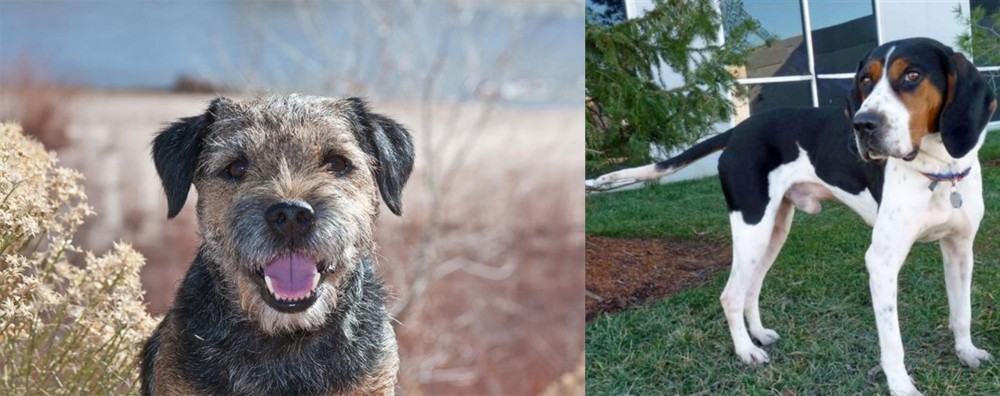 Border Terrier is originated from United Kingdom but Treeing Walker Coonhound is originated from United States. Border Terrier may grow 29 cm / 11 inches shorter than Treeing Walker Coonhound. Border Terrier may weigh 25 kg / 55 pounds lesser than Treeing Walker Coonhound. Both Border Terrier and Treeing Walker Coonhound has almost same life span. Both Border Terrier and Treeing Walker Coonhound has almost same litter size. Border Terrier requires Moderate Maintenance. But Treeing Walker Coonhound requires Low Maintenance
Border Terrier is originated from United Kingdom but Treeing Walker Coonhound is originated from United States. Border Terrier may grow 29 cm / 11 inches shorter than Treeing Walker Coonhound. Border Terrier may weigh 25 kg / 55 pounds lesser than Treeing Walker Coonhound. Both Border Terrier and Treeing Walker Coonhound has almost same life span. Both Border Terrier and Treeing Walker Coonhound has almost same litter size. Border Terrier requires Moderate Maintenance. But Treeing Walker Coonhound requires Low Maintenance
 As a working dog, the Border Terrier comes from the border country between England and Scotland. To be more specific, the dog originates from the rough hill country in the areas on both sides of the border between England and Scotland – an area known as 'The Border Country'. The breed was developed by the farmers, using the Terriers to help contain the fox population.
As a working dog, the Border Terrier comes from the border country between England and Scotland. To be more specific, the dog originates from the rough hill country in the areas on both sides of the border between England and Scotland – an area known as 'The Border Country'. The breed was developed by the farmers, using the Terriers to help contain the fox population.
It is believed that they are related to other kinds of terriers which also came from this region such as the Bedlington- and Dandie Dinmont Terriers. The first Border Terrier was registered in 1913 with the British Kennel Club. Later, the Border Terrier Club was also formed. A club for these dogs was also registered in the United States in 1930.
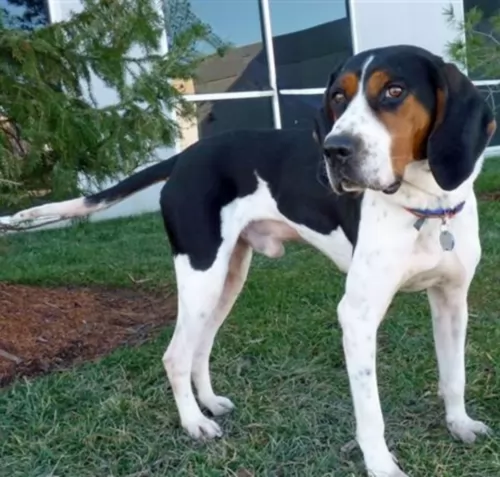 The Treeing Walker Coonhound originated in the United States and comes from English and American Foxhounds.
The Treeing Walker Coonhound originated in the United States and comes from English and American Foxhounds.
The fact that the dog has the word ‘Treeing’ in its names means that it is a hound dog that runs after its prey, sending it running up a tree to escape until the hunter reaches the tree and can shoot the prey.
 The Border Terrier is a small to medium sized dog, weighing roughly between 5- and 7kg and standing at anything between 28 and 40cm in height. With his dark brown eyes and keen, alert expression, and with ears dropping forward, people describe the head as being like that of an otter. He is a courageous worker and a loyal companion but some people may not take kindly to him wanting to dig under-, or climb over barriers to get out to follow a scent or to go exploring.
The Border Terrier is a small to medium sized dog, weighing roughly between 5- and 7kg and standing at anything between 28 and 40cm in height. With his dark brown eyes and keen, alert expression, and with ears dropping forward, people describe the head as being like that of an otter. He is a courageous worker and a loyal companion but some people may not take kindly to him wanting to dig under-, or climb over barriers to get out to follow a scent or to go exploring.
The Border Terrier is a rough coated dogs of medium size with narrow build. The dog’s height is slightly greater than the dog’s length. The coat can be tan and black or dark grey. Sometimes the coat is described as grizzle - dark tipped hairs which give an overlay of color to the tan or red coat. You can also possibly find some white on the muzzle or chest. He has a double coat, with the outer coat being short, dense and wiry. The tail is of medium length and the ears drop forward toward their cheeks.
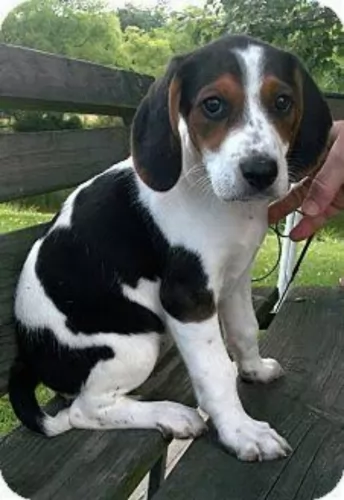 The Treeing Walker Coonhound looks very similar to a Beagle, just with much longer legs.
The Treeing Walker Coonhound looks very similar to a Beagle, just with much longer legs.
He stands at between 51 and 69cm in height both male and female and it weighs between 23 and 32kg.
The coat is short and glossy being either bi- or tri-colored – white, tan and black. The body and legs are strong and muscular. He has fairly long, floppy ears. The eyes are brown, intelligent and alert while having quite a gentle expression.
The muzzle is long and narrow. He has large, floppy pendant ears. The eyes are large, brown and have a soft and gentle expression. The tail is set high and is long.
This breed may be an excellent sport dog but he loves spending time quietly with his human family too, making a great family pet.
He is gentle and makes a great playmate for disciplined children. He is intelligent and it will do both owner and dog the world of good to have him trained and socialized.
They’re stubborn dogs, so it simply makes him well behaved, balanced and a pleasure to have around. He will learn commands easily and readily. If you want a good family pet, the Treeing Walker Coonhound is even-tempered and non-aggressive.
 A Border Terrier is a dog that has to be part of the family. You can’t just stick him in your back yard as he will just pine away with unhappiness. Boredom and loneliness will cause him to bark and he has a loud bark. He’ll become destructive – characteristics that aren’t his fault because he didn’t ask to be bought and just stuck away.
A Border Terrier is a dog that has to be part of the family. You can’t just stick him in your back yard as he will just pine away with unhappiness. Boredom and loneliness will cause him to bark and he has a loud bark. He’ll become destructive – characteristics that aren’t his fault because he didn’t ask to be bought and just stuck away.
Train and socialize your Border Terrier so that he becomes the great dog he is intended to be. He gets on well will children who have been taught to be kind to animals and he will get along with other pets in the home. The Border Terrier is an affectionate, sensitive dog and once trained he is willing to obey your commands.
The Border Terrier isn’t the greatest guard dog but is best known for his loving, devoted and loyal nature. He loves his food, and if you feed him well, provide him with a warm, dry place to sleep and provide him with lots of attention and exercise, you’ll have the most devoted and loving friend for life.
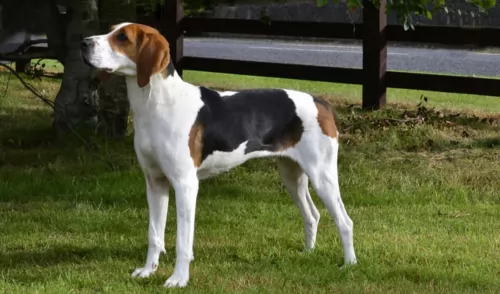 These dogs are loving, loyal confident, social and intelligent, making good companion dogs.
These dogs are loving, loyal confident, social and intelligent, making good companion dogs.
Whether they're outdoors being full of energy and on a hunt, they always give of their best. When they're at home with their human family, they put work behind them and become gentle, mellow pets, loving to just take it easy with their human family.
 Border Terriers are a healthy breed and with good food and plenty of love and attention, they can reach 14 years of age. It is to be noted with this dog breed that he doesn’t show signs of pain or sickness easily so you want to watch him closely.
Border Terriers are a healthy breed and with good food and plenty of love and attention, they can reach 14 years of age. It is to be noted with this dog breed that he doesn’t show signs of pain or sickness easily so you want to watch him closely.
Canine Epileptoid Cramping Syndrome - This is a disease which can be evident from 7 months of age already. The disease was once known as Spike's Disease, and its an hereditary disease of Border Terrier dogs. The cause of the disease is unknown but it is similar to canine epilepsy. It is thought that a contributing factor can be gluten, so a gluten-free diet will be recommended.
Heart defects can also affect Border Terriers, one of which is pulmonic stenosis. This is a narrowing of the valve which separates the right chamber of the heart from the lungs. It can ultimately lead to arrhythmia to congestive heart failure. He’ll have difficulty with breathing, suffer from abdominal distension and won’t be able to exercise properly.
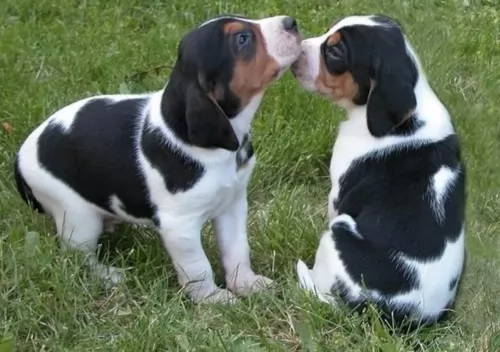 The Treeing Walker Coonhound is looked upon as a healthy dog breed that can be 10 – 13 years of age. Even so, there are diseases that can plague him, and hip dysplasia and ear infections are two that you need to be aware of.
The Treeing Walker Coonhound is looked upon as a healthy dog breed that can be 10 – 13 years of age. Even so, there are diseases that can plague him, and hip dysplasia and ear infections are two that you need to be aware of.
This is when the ball and socket joint isn't formed properly so that there is a grinding action of the joint instead of it sliding smoothly. This common skeletal disease is found in young and old dogs, and it seems more prevalent in larger dog breeds.
Your dog will have pain in the hip joints and even loss of muscle mass in the thigh area. You’ll notice that he becomes less active. Your dog will need to get to the vet so that the vet can suggest treatment for pain and to make him more comfortable.
As a floppy-eared dog, the Treeing Walker Coonhound will scratch at his ears and shake his head if he has an ear infection. With an ear infection inflammation affects the ear canal and can result in deafness. With his floppy ears moisture within the ear can attract bacteria and yeast.
Your pet will need to get to the vet because an ear infection is a painful condition.
 Because the topcoat of the Border Terrier is dense and harsh with a thick undercoat, he will require moderate grooming. He doesn’t shed too much. Brush your Border Terrier twice a week to remove dead hair and keep your dog’s coat healthy. As part of his grooming, keep his nails clipped as well as his teeth checked and brushed at least twice a week. Make use of specialized dog toothpaste and brush.
Because the topcoat of the Border Terrier is dense and harsh with a thick undercoat, he will require moderate grooming. He doesn’t shed too much. Brush your Border Terrier twice a week to remove dead hair and keep your dog’s coat healthy. As part of his grooming, keep his nails clipped as well as his teeth checked and brushed at least twice a week. Make use of specialized dog toothpaste and brush.
The Border Terrier can quickly put on weight so it is important to feed him according to the instructions on the packaging if you’re going to be feeding him with commercially manufactured dog food. Make sure its a quality brand and one which caters for his energy requirements.Dogs are individuals, and they don’t all eat the same amount. As a responsible dog owner, it is up to you to monitor your pet and understand his unique requirements.
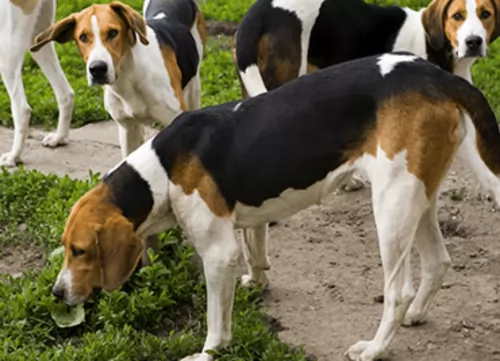 ● A healthy diet with vitamins and minerals as well as essential fatty acids is imperative. To get this in a commercially manufactured dog food, you will need to buy the best, high-quality ones. Some of the inferior brands have all kinds of bad stuff in them such as colorants preservatives and fillers.
● A healthy diet with vitamins and minerals as well as essential fatty acids is imperative. To get this in a commercially manufactured dog food, you will need to buy the best, high-quality ones. Some of the inferior brands have all kinds of bad stuff in them such as colorants preservatives and fillers.
Try and give him some homemade food such as boiled chicken, brown rice and vegetables. Dogs want simplicity in their foods. They can't stomach highly spiced, salted and exotic foods. Plain, wholesome foods keep him healthy and happy.
● It is recommended that you have your dog spayed or neutered. Not only will you prevent an unwanted litter, having them spayed or neutered prevents serious diseases later on. Also, have
your Treeing Walker Coonhound immunized to prevent some of the deadly canine diseases there are.
●These dogs are active, sporty dogs known for their stamina. To keep them lean, athletic and fit, they will require lots of exercise. They love a walk but will require more than a regular walk. Hikes are more what they have in mind. They never tire of hectic ball games, hide and seek and swimming. Because they are active, alert and intelligent dogs, they will need mental stimulation too.
● Your Treeing Walker Coonhound isn't a high maintenance dog because their short coat is easy to keep groomed just by giving him a good brush once or twice a week.
Make the grooming session a time to check him over for ticks and fleas and any unusual lumps on his body. It's a time to look at his eyes to make sure they're clear and bright without any discharge. Check inside his ears for redness and infection.
Trim his nails too. Remember he can't tell you about his teeth, so try and look inside his mouth to see that all is well. A good sign of bad teeth is bad breath. There are professional groomers who are willing to do all these grooming chores for you.